Photographs: Faisal Mahmood/Reuters
Krishnakumar P probes the Pakistan army's tall claims of victories against the Taliban in the tribal areas of Swat and South Waziristan, and finds that the powerful army might be stage-managing its offensives
While armies the world over struggle for years to put down insurgencies, the Pakistan army has claimed to have defeated the Taliban in less than 20 days.
In contrast, the Iraq war has been going on for seven years now with no end in sight. Ditto, the Afghan war. The Liberation Tigers of Tamil Eelam thumbed its nose at Sri Lankan army for over two decades.
Closer home, whatever peace we have seen in the Kashmir valley in the past two decades has been shaky and temporary at best. Similar is the case of the northeast.
But this is not the case with Pakistan. Sample these headlines from recent months: 'Pak army claims Swat, Buner cleared of Taliban terrorists', 'Swat operations almost over: Pakistan army'.
So, just what is happening in Pakistan? Is the army exaggerating its claim? Are these battles taking place at all? Or is there more to it than meets the eye?
Before looking for answers for these questions: first, the details:
In what is termed as the first phase, in the 20 days since the launch of the operation on the night of October 16, the military has captured all the major towns and villages in the region. It is now poised to march into Mehsud tribe's regional headquarters of Laddah in South Waziristan.
In the second phase, the army will concentrate on consolidation and clearance to penetrate into the region and bring back the political administration.
The third phase will involve the handing over the region to the Mehsud tribe that has been evacuated for the sake of the military operation. Everyone can then go back home and everything will be fine.
This is the picture the Pakistan army is painting. But Indian intelligence agencies and military experts, who have been watching the developments closely, say the operation is a lot more complex than it seems to be and in the end, might even result in a direct threat to India.
'You kick ass and come away'
Image: Men, fleeing a military offensive in South Waziristan, wait for their handouts at a distribution point for internally displaced persons in Dera Ismail Khan, located in Pakistan's restive North West Frontier ProvincePhotographs: Mustansar Baloch/Reuters
Officials in both the Research and Analysis Wing and the Intelligence Bureau say that the victories claimed by the Pakistan Army in Swat and Waziristan are completely stage-managed. "The fact of the matter is that the army is not striking at the important targets and persons in the Taliban," an intelligence source said.
Sources said that the Pakistan Army finds it difficult to strike at these targets or persons since it is their own creation. "Moreover they will not take them on full-on since they would require these persons for a larger goal against its neighbours. The question of winning arises only when they have fought a war. In reality the Pakistan Army is fighting no war since it cannot afford to take on its own creation," the source added.
To understand what the Pakistan army is doing, one has to look at a bit of history, experts say.
"India as a civilizational entity has been unified thrice. Under the Mauryan empire, the Mughals and the British. All these three empires left alone the densely forested tribes of central India and the northern tribes on the other side of the Indus. None of the three empires penetrated these regions administratively. This was primarily because all three were agrarian empires and these two regions did not have any agricultural surplus. Therefore it did not make economic sense to penetrate these two areas," says Major General (retired) G D Bakshi, who has loads of combat experience, especially in Kashmir, and is a keen student of military history.
But the British, whenever there was an uprising in Pakistan's tribal areas, put them down by conducting what is called an offensive sweep.
"The British policy in these areas was what was called the offensive sweep. Once in a while you go in, conduct raids and come away. You couldn't stay there. There was no logistics and infrastructure. It was the primitive nature of these societies that led to this style called the frontier warfare," Bakshi says.
Though the Pakistan Army has inherited this method, it is not graduating from the frontier warfare. "You kick ass and come away. This leads to what we in the military call the temporary neutralisation as opposed to complete and permanent neutralisation," Bakshi said.
The military establishment is quite convinced that this is a system that will last for decades. "You have to psychologically tire them out and get the people (in this case the Mehsud tribe) on your side, because everybody loves a winner. But this will not happen as long as the Pakistani Army does not establish a counter insurgency grid," Bakshi says.
In simpler terms, establish a series of posts to defend the roads, major population centres. "Then you go out and penetrate the countryside and bring in governmental control. The Americans call this the 'Clear hold build' model," Bakshi says.
Instead of targeting the terrorists, they end up killing the civilians
Image: Pakistani soldiers prepare to fire mortars towards Taliban militant positions in South WaziristanPhotographs: Faisal Mahmood/Reuters
Here's what happened to another army that employed the offensive sweep model. "The British army ran three punitive campaigns between 1862 and 1900. In addition, there were 62 offensive sweeps in Afghanistan in the same period. In the end, the whole problem started again before 1930," Bakshi says.
Thus by refusing to establish a counter insurgency grid, the Pakistani army -- though it wins temporary gains -- is basically shooting itself in the foot.
But the problem with Pakistan lies not just in some military jargon about tactics. It is deeper. It is about people. The Pakistan Army has a large number of Pathans, with the rest being mostly Punjabis. The terrorists they are supposed to be fighting are also Pathans.
"The Americans believe that by using the carrot of money, they can get the Pakistanis to fight against the tribes. But this will never happen. They will not fight for the simple reason that the ethnic composition of the Pakistan Army is 28 percent Pathan; the rest is Punjabi. If the Pakistan army is to go the full hog and get involved in counter insurgency operations, it would mean daily fighting with an ethnicity that traditionally puts a high premium on badl (revenge)," Bakshi said.
To understand the situation that it may lead to, he points to Operation Bluestar. "When we stormed the Golden Temple you saw the price we paid for it. There was a near mutiny in our ranks."
Another problem is that the Pakistan Army has traditionally packed its borders with India. This in turn means that they can't spare as many boots on the ground in the western front as needed.
"Not only is this operation not by the CI (counter insurgency) book, but it also violates every rule in that book. A proper victory would mean a 20-year deployment of the army where five out of nine corps (a corps has approximately 50,000 men) is on the other side of the Indus. But then if they do that, the very raison d'etre of the Pakistan army ceases to exist," Bakshi says.
So, according to Indian experts, what the Pakistan Army is doing is basically fuelling resentment into an already alienated ethnic community. And instead of targeting the terrorists, they end up killing the civilians. Intelligence sources say there are good reasons for the Pakistani army staying away from the real terrorists.
"Till now, the Pakistan army and the ISI have been training and funding a large number of Taliban terrorists," the intelligence source said.
'They have achieved displacement, not destruction'
Image: A Pakistani soldier crouches as a Mi-17 helicopter takes off on top of Kund mountain near Kotkai village in South WaziristanPhotographs: Nicolas Asfouri/Agency/Reuters
On the current operation, Indian intelligence inputs suggest that the Pakistan Army had to create something similar to the current situation to tell the world that it has staged a victory.
"You give them a wink and a nod and then go into the towns and villages with 155 mm artillery gun, F-16s and Abraham tanks. Only innocent civilians get hit. Three million refugees have been created because of this indiscriminate use of force. Their aim is to terrorise the people into submission. So what is happening now is, like the French say, magnificent, but not war," Bakshi adds.
There is a word of warning also. The way the Pakistanis are going, experts say, will result in a dismal backlash.
"We are seeing the beginning of the collapse. If the Pashtun-Punjabi biradari breaks up, Pakistan breaks up. By launching this operation the Pakistan Army, which was firstly not very keen, has now unwittingly engineered the perfect recipe for a blowback."
"It all looks very awe inspiring. For some time they will be cowed down. Three six months, one year. Then what happens? All the families go into these tented camps, where they will lead a miserable life. Their people have been killed. And all this with an ethnic grouping that has a traditional system of badl that runs into seven generations. It doesn't take much military expertise to see what will be the result of these offensives," he says.
The Indian military establishment also doubts the claims about the scale of the military success.
"They have produced very few corpses. All that they have managed to do is drive the terrorists out of these areas. What they have achieved is mere displacement, not destruction. Even the authenticity of these claims is purely theoretical. If you haven't showed the corpses for whatever reason -- and this is not a squeamish army by the way -- that's fine. But display the weapons. What I have so far seen on the Internet has been country pistols and pea shooters," Bakshi says.
Pakistan had no option but to stage-manage a victory
Image: Labourers travel through a distribution point for internally displaced persons in Dera Ismail KhanPhotographs: Akhtar Soomro/Reuters
Bakshi says that the repercussions could be far worse than one would initially imagine.
"As far as one is seeing the Pakistani state as a system, it has shot itself in the foot. It has become ungovernable. We lurch from one headline to another headline. We don't do a system analysis. Pakistan now has 250,000 armed jihadis. And the army itself is just twice that size, about 500,000 men," he says.
And in the end, everything, observers say, is linked to the money.
The state is also severely bankrupt and has to depend entirely on aid from foreign countries, primarily the US. Indian intelligence sources say that, with increasing pressure to show action against terrorism, Pakistan had no option but to stage-manage a victory to show that it was acting against the Taliban.
On Pakistan's economy, Bakshi says: "This is what the Pakistani economist Kaiser Bengali called the low equilibrium trap. Pakistan has come to the verge of collapse twice in the last 10 years. To get the Kerry-Lugar Bill largesse, they need to show some motion of action. When they signed on in the global war on terror, they got $12.3 billion. It is a different matter that they spent $5 billion on Swedish AWACS and German subs. None of it was required against the Taliban. They have used it to buy Chinese fighters frigates."
Pakistan will now get $7.5 billion over the next five yrs. The IMF has been asked to give another $7.5 billion. Friends of Pakistan will raise another $5 billion.
Bakshi concludes: "Add the $3 billion military aid that Pakistan will get for the so-called counter insurgency operations and they have another $30 billion dollars in the next 10 years. No wonder then that the Pakistan has the fastest growing nuclear arsenal in the world. If the Americans want to give them money, fine. That is their lookout. In any case, Pakistan would need 20-30 billion dollars every year to stay afloat. But for God's sake don't fund its military and nuclear competition with us. This way, the US is harming us."

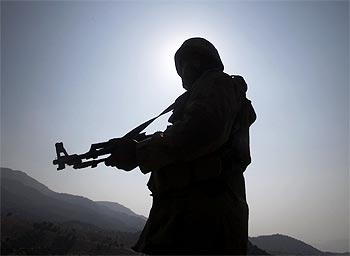
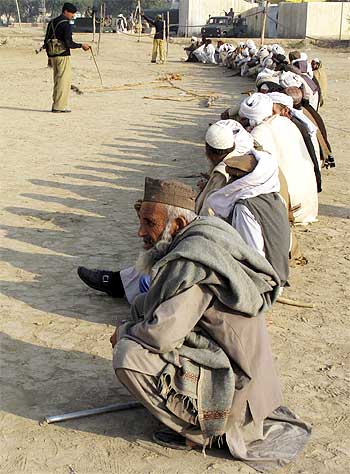
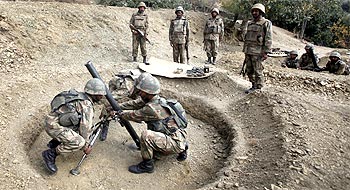
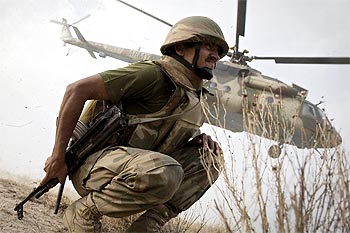
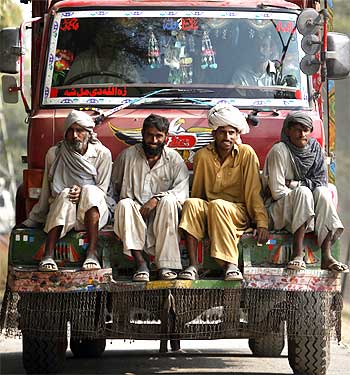
article